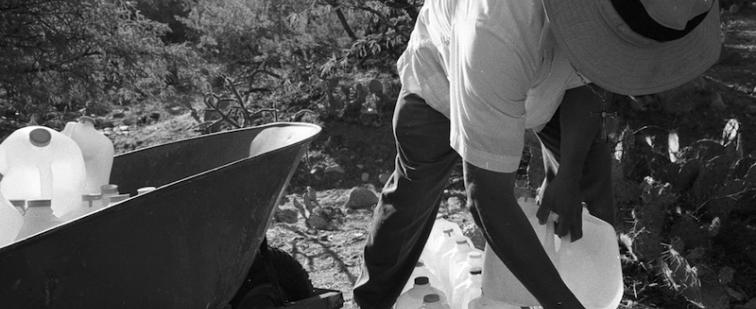Home
The Obama administration appears to be quietly relaxing a five-year Bush-era ban on Cuban cultural exchanges. New York City recently hosted its first Cuban band in five years, after the group Septeto Nacional became the first to win a visa that allowed it to accept a booking there.
Late December, the administration of Peruvian President Alan García rammed through a final report of the special commission to investigate and analyze the violence that erupted last June 5 in Peru's Bagua province. The report of the Commission Of Inquiry has been widely criticized as an embarrassing attempt to validate the government's version of the root causes of the events.
On November 29, 2009, Porfirio "Pepe" Lobo was declared the winner of the Honduran Presidential election, collecting 56% of the votes cast. Under ordinary circumstances, the center-right politician's electoral victory in this small, impoverished nation would hardly garner notice from all but the keenest observers of the region's political scene. But for observers in Latin America, where tremendous strides have been made in overcoming the legacy of political violence and military dictatorship - accompanied in many cases by the empowering of popular sectors - what transpired in the run-up to the election created circumstances that were far from ordinary.
Last February, some 18,000 Guatemalans, mostly survivors or relatives of victims of the state-sponsored terror of the 1970s and 1980s, gathered in Guatemala City's Plaza of the Constitution to commemorate the "Day of Dignity for the Victims of the Internal Armed Conflict." There, they heard President Álvaro Colom publicly accept the findings of the UN report that documented the terror. This, together with Colom's official apology on behalf of the Guatemalan government and armed forces, were framed by the image of an angel with wings formed of the shoulder blades of victims of the violence. The angel has now become an iconic image of the struggle for human rights in Guatemala and internationally.
The Mexican Electrical Workers Union (SME) celebrated its 95th anniversary on December 14 with cultural events and pledges to continue to fight for the jobs of its members. But now, two months since President Felipe Calderón's liquidation of the state-owned Central Light and Power Company (Luz y Fuerza del Centro), seizure of the facilities, and firing of the 44,000 workers, and faced with the government's intransigence, the union has been forced to change its strategy.
Marco Enriquez Ominami railed against Chile's ruling center-left coalition, the Concertación, for being "dinosaurs" who were "out of touch" with the public. Although he captured only 20% of the vote in the first round of Chile's presidential elections, it was still a remarkable feat for a 36-year-old senator running as a progressive independent in a country where for the past 20 years without fail, about 60% of the vote has gone to the Concertación and 40% has gone to the right. For now, polls show that conservative billionaire Sebastian Piñera (who won 44% of the vote in the first round) will most likely win Chile's second round of presidential elections on January 17.
Thousands of MAS (Movement Towards Socialism) supporters filled the Plaza Murillo on Sunday, December 6, to catch a glimpse of the re-elected Bolivian president Evo Morales on the balcony of the Presidential Palace. Amidst the fireworks, clenched fists, celebrations and MAS flags read a banner, "Now it is time to nationalize the private media." Nationalization and Evo Morales go hand in hand, as the MAS leader has returned control of the nation's resources to the Bolivian state since taking power in 2006. But the banner did not represent an ideological position as much it reflected the anger generated by the opposition the extremely popular Morales continues to face from the country's privately owned media.
On June 20, 2009, soldiers set up a military checkpoint in Huamuxtitlan, a small town in the La Montaña region of the state of Guerrero, one of Mexico's many drug-war hot spots. They called a northbound passenger bus to a halt, searched it for drugs and weapons, and detained a passenger named Fausto Valera because he was wearing military-style boots. Perhaps suspecting that he was an insurgent, the soldiers demanded to know where he got the boots. When his answers failed to satisfy them, they placed him under arrest. The incredulous bus driver asked the soldiers to note in his log book that Valera was in their custody. After some complaining, they reluctantly did so.
Who is Rody Alvarado Peña? For much of the 1980s and early 1990s, she was one of Guatemala's thousands of battered women, suffering daily violent abuse at the hands of her husband. Since escaping to the United States in 1995, she has become a symbol of America's ambivalent treatment of female asylum seekers. Three presidential administrations and countless judges deliberated, appealed and ultimately deferred decisions on her case, but a recommendation issued in October may finally make Ms. Peña a legal U.S. resident.
Dole Food Company and Chiquita Brands International paid a Colombian terrorist organization to perform protection services that included murdering trade unionists, demobilized paramilitary José Gregorio Mongones said in an affidavit released December 6. The testimony is the centerpiece of two civil lawsuits against Chiquita and Dole filed by family members of victims of paramilitary violence in Colombia. Both lawsuits accuse the companies of funding the Autodefensas Unidas de Colombia (Colombian United Self-Defense Units, or AUC), the country's largest paramilitary organization, formally demobilized in 2006.












